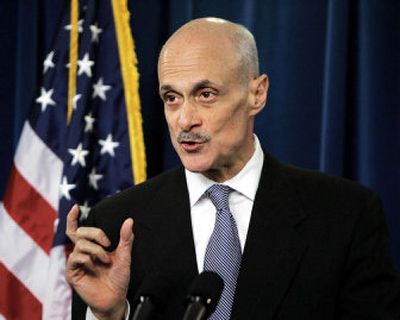House issues scathing report on Katrina aid

WASHINGTON – Hurricane Katrina exposed the U.S. government’s failure to learn the lessons of the Sept. 11, 2001, terrorist attacks, as leaders from President Bush down disregarded ample warnings of the threat to New Orleans and did not execute emergency plans or share information that would have saved lives, according to a blistering report by House investigators.
A draft of the report, to be released publicly Wednesday, includes 90 findings of failures at all levels of government, according to a senior investigation staffer who requested anonymity because the document is not final. Titled “A Failure of Initiative,” it is one of three separate reviews by the House, Senate and White House that will in coming weeks dissect the response to the nation’s costliest natural disaster.
The 600-plus-page report lays primary fault with the passive reaction and misjudgments of top Bush aides, singling out Homeland Security Secretary Michael Chertoff, the Homeland Security Operations Center and the White House Homeland Security Council, according to a 60-page summary of the document obtained by the Washington Post. Regarding Bush, the report found that “earlier presidential involvement could have speeded the response” because he alone could have cut through all bureaucratic resistance.
The report, produced by an 11-member House select committee of Republicans chaired by Rep. Tom Davis, R-Va., proposes few specific changes. But it is an unusual compendium of criticism by the House GOP, which generally has not been aggressive in its oversight of the administration.
The report portrays Chertoff, who took the helm of the department six months before the storm, as detached from events. It contends he switched on the government’s emergency response systems “late, ineffectively or not at all,” delaying the flow of federal troops and materiel by as much as three days.
The White House did not fully engage the president or “substantiate, analyze and act on the information at its disposal,” failing to confirm the collapse of New Orleans’ levee system on Aug. 29, the day of Katrina’s landfall, which led to catastrophic flooding of the city of 550,000 people.
On the ground, Federal Emergency Management Agency director Michael Brown, who has since resigned, FEMA field commanders and the U.S. military’s commanding general set up rival chains of command.
At the same time, weaknesses identified by Sept. 11 investigators – poor communications among first responders, a shortage of qualified emergency personnel and lack of training and funding – doomed a response confronted by overwhelming demands for help.
“If 9/11 was a failure of imagination then Katrina was a failure of initiative. It was a failure of leadership,” the report’s preface states. “In this instance, blinding lack of situational awareness and disjointed decision making needlessly compounded and prolonged Katrina’s horror.”